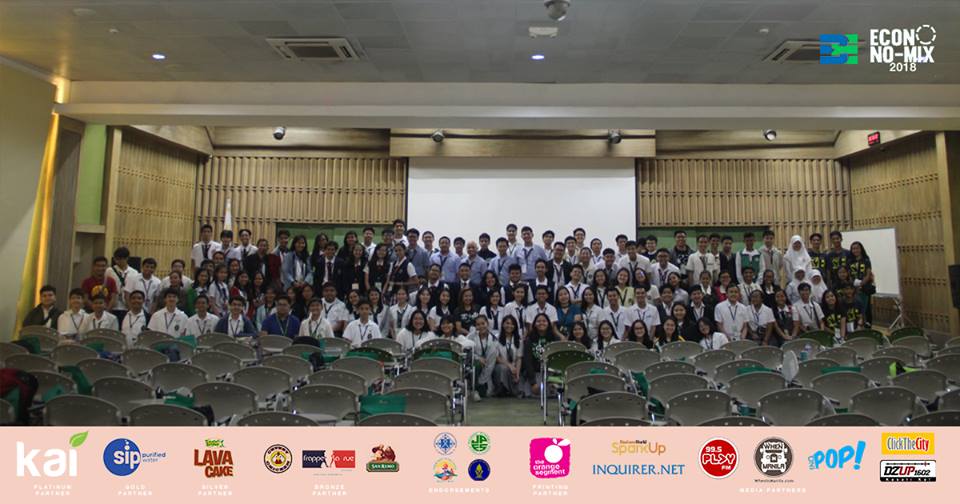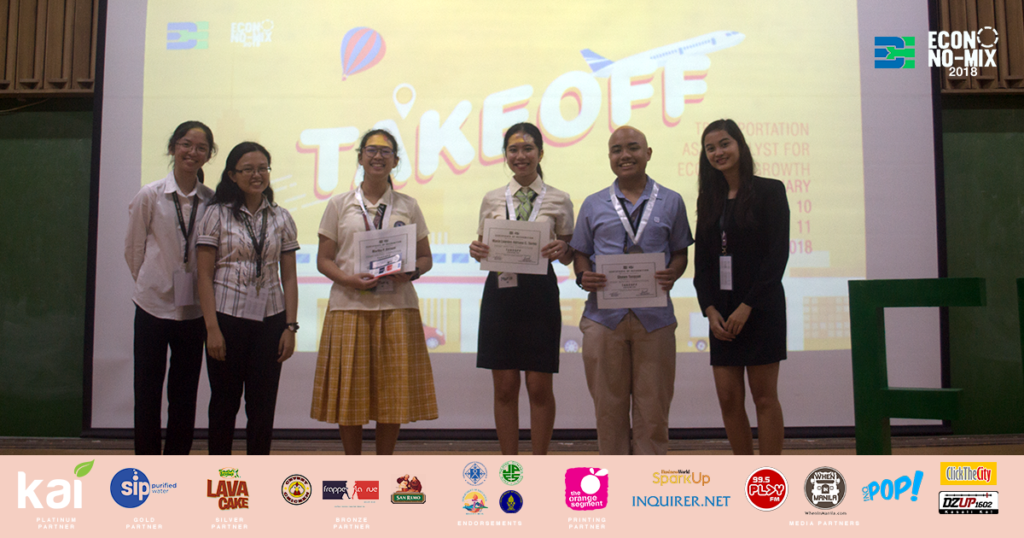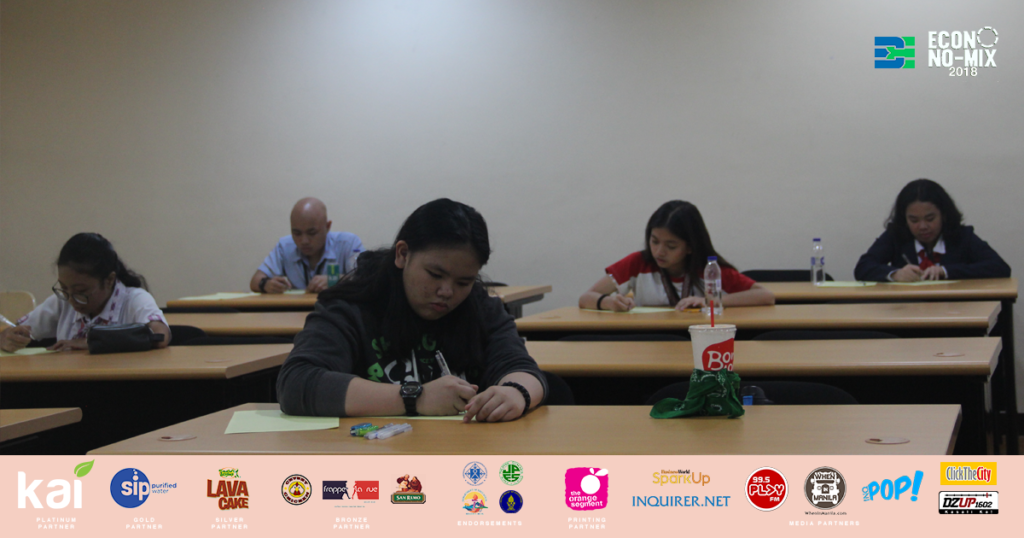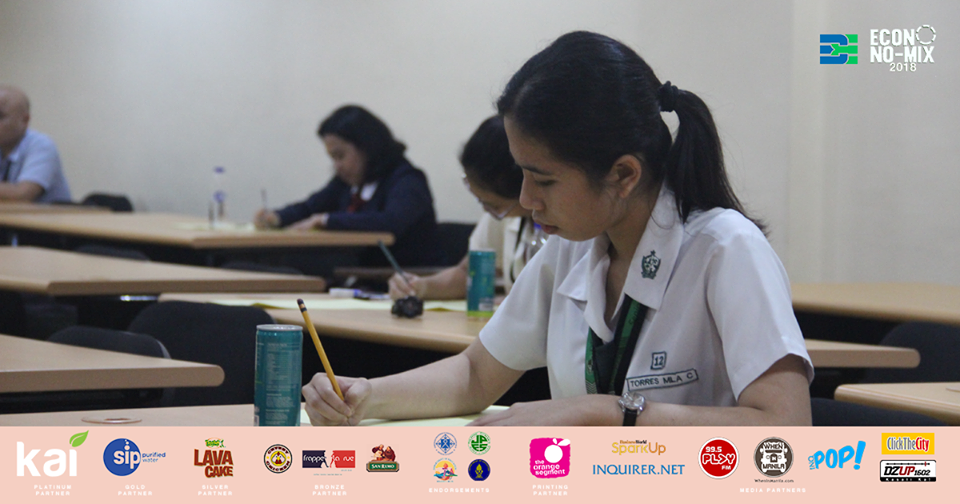Last February 10 – 11, the UP Organization of Business Economics Majors (UP OBEM), a student organization based in the UP School of Economics, held its annual flagship event Econ No-Mix in the University of the Philippines – Diliman. A Luzon-wide economics convention for junior and senior high school students, Econ No-Mix was envisioned as an avenue for the youth to discuss economics and its various applications in everyday life. The event hopes to instill within students a deeper understanding of and appreciation for the field through a series of talks and competitions held within a two-day period.
This year, Econ No-Mix is entitled “Takeoff: Transportation as a Catalyst for Economic Growth”, focusing on transportation economics and its current implications on Philippine society. The theme was chosen to be in line with increasing concerns on public and private transportation, as well as with the Duterte regime’s “Build, Build, Build” initiative, which includes a number of projects in the transportation sector. The talks and competitions served as a way for the participants to learn more about the current state of the transportation system in the Philippines, including possible means to ensure its long-term sustainability, all while being linked to basic and relevant economic concepts and applications.
As one of the highlights of the event, the Essay Writing Competition was held last February 10 from 1:00 – 4:00 p.m. in the UP School of Economics. Participants were asked to write an essay in line with the chosen theme, “Breakthrough: The Philippine Economy amid Transportation Innovation”. Entries were shortlisted by two of UP OBEM’s partner organizations, the UP Economics Towards Consciousness and UP Lingua Franca. Meanwhile, the top three essays were chosen by Dr. Jose Dalisay, Jr., who received the TOYM award in 1993 and entered the Palanca Hall of Fame in 2000 for his work on creative writing and journalism.
Commended for well-constructed arguments and good use of statistics, the winning essay was judged to be that written by Martha P. Balagat, a student from Philippine Science High School – Main Campus. Entitled “The Meaning of Innovation”, her essay can be read in full below.
###
The Meaning of Innovation
It is 2018. The buzzword on everyone’s lips is innovation, or change, its simpler, more deceitful translation. In a fast-paced world where time is the currency in least supply, where a man’s productivity is now his measure of success, the word “innovation” is equivalent to the sweet promise of progress. It is that frequent daydream of everyone who finds themselves stuck in the toxic pits of EDSA, trying to bear the noise of entitled drivers, or the stench of your seatmate’s armpits. It gets harder to visualize progress, economic progress least of all, when your precious time is being sucked away by the everyday enemy that is road congestion.
It doesn’t take a degree, or a car, to realize how traffic and congestion slow down economic growth, because its effects are felt by all. Never mind if you are a business manager late for a meeting, or a jeepney driver trying to beat the daily quota, or a truck driver rushing to bring tons of fresh produce to the pier, or a regular student – all people and all goods travel on the same congested roads. As a country’s economic development is reflected by the conditions of the transportation sector, it comes as no surprise that we lose 0.8% of the national GDP yearly to congestion, measured by loss in working hours and increase in energy consumption.
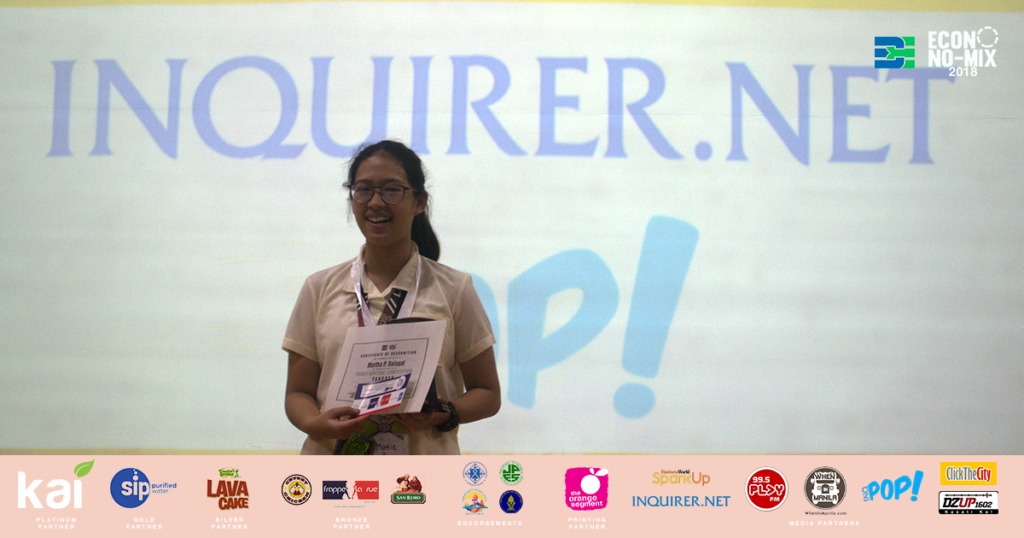
The transportation sector, along with services and communications, accounts for five to six percent of the GDP. The nature of transportation, as a complex web of services and transfers, is involved in nearly every facet of the economy, and thus can have great effects on development that cannot be measured directly. Transportation is responsible for movement within the economy. More than determining the level of output of firms and the maximization of all resources poured into the economy, it is responsible as well for raising the quality of life in an area, by making more economic opportunities, such as better livelihood and education, accessible. It is of utmost importance then that the conversation about innovation and transportation should include the modern Filipino in the equation.
The talk of innovation starts when we carefully study the current systems in place. In the case of the Philippines, it starts by skillfully untangling the gigantic mess revolving around transportation. We can deconstruct the problem into three things: poorly-designed cities and mass transportation systems, disorganized supply chain systems, and the great evil that is corruption and graft in the bureaucracy.
The current state of Metro Manila is the result of our colonial history and lack of foresight. The cramped city plans of the Spanish, combined with the poor adaptation to American traffic laws, as well as the absence of a long term transportation plan that could keep up with economic growth, are the reasons why this city and other urban centers have become so congested. 30% of the city’s population travel in the cars that make up 87 percent of road traffic, and the ongoing response to the growing number of privately-owned vehicles has been to make the roads contain them. Sidewalks have been stripped and bike lanes have been taken over in the interest of these cars, when cities should be designed for people. The improvement of the mass transportation system is then necessary, even more than the promotion of ride-sharing or ride-hailing online services, which can only solve the current problems of congestion due to private vehicles.
The PUV modernization project of the government is one of the facets of improving mass transportation, and one of the most hotly-debated. Everyone can agree that jeepneys – those dilapidated and smoke-belching vehicle models – should have long been phased out, for what negative effects these have had on pollution. However, in the conversation of innovation, it is important that modernization does not leave out the sectors relying on these jeepneys, primarily the jeepney drivers and their families. Innovation is sustainable – a mere of jeepney phaseout must take into account the livelihoods of these people, and ensure that they are properly compensated and not left behind during transition. The adapted technology, aside from ensuring that these are fit for the roads, must also be properly explained and taught to concerned sectors. Again, innovation must include the Filipino in the equation.
The improvement of mass transportation, as well as supply chain systems, relies on proper investment of necessary infrastructure. When it comes to getting cargo from one place to another, the nature of the Philippines as an archipelago introduces difficult logistics barriers. There exist virtual inter-island highways, by the way of the RORO system, but these still fail when it comes to getting resources to the corners of the archipelago. The government and other private sectors need to work on building infrastructure such as paved roads, rails and bridges outside the urban capitals. In doing so, not only will logistics costs be reduced, but a greater number and variety of products will be available to a greater number of people, and services can be decentralized form urban to rural. Innovation must be inclusive – in times of natural calamity, these transport networks will be crucial in saving lives of Filipinos in far-flung barrios. Information systems and real-time technology will also greatly impact the operations of both urgent crisis response and non-urgent commercial activities through standardizing and speeding certain procedures.
In the great many systems that transportation deals with, it is important that policies be held in place and implemented well. Innovation calls for responsibility and transparency in the government and the private sectors involved in manning these projects. The economy would progress faster if graft and corruption were non-existent, and politician placed the interest of the Filipino before the interest of their bank accounts. Take, for example, the case of buyout with the MRT-3, and what millions of taxpayers’ money it wasted. It also caused hours of dead operations, displacing thousands of commuters and placing intersections in dreaded grid-lock. The public and private sector must cooperate for the good of all – perhaps we would get less traffic if the MMDA and water or electric utilities cooperated in dealing with road inconveniences! Innovation is progressive – it leaves no vacancy for waste and backdoor deals.
Innovation is a buzzword often raised without much thought, and so it is the duty of future policy-makers and groundshakers to stop and think of what this word really means in the Philippines. As earlier discussed, it is more than just introducing technology in the promise of modernization. It means realigning goals to the vision of a better Philippines for all. It means shifting paradigms, letting innovation start from the ground up, the grassroots, or the people that will be affected most. It means talking about the common Filipino and what his needs are. It means talking about the people left out of the usual conversation, the silent movers of the economy.
It is 2018. The farmers earn less than what they should, because they pay for trucks and jeepneys to transport their harvest on unpaved roads leading to the market. The piers are congested and the truck drivers in the line for unloading have been awake for more than 24 hours. Towns and landmarks hailed as tourist spots, suffer from the air pollution brought by noisy tourists and tricycles. Those living in the farthest corners of the mountains still await relief goods 48 hours after the storm has devastated their homes and family members. Innovation must mean more to them than just an empty word.

